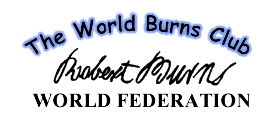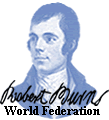


 |
 |
 |

|
A very interesting
question ! Particularly interesting when you consider that most people
throughout the civilised world recognise these three simple words, yet
few may actually know what "Auld Lang Syne" is all about. Of course, many
will instantly associate the words with "Scotland" or perhaps "New Year"
Some consider it to be an international expression of friendship, fellowship
and hope. Others perceive it to be a simple song, presented at the conclusion
of a social gathering, remembering the past and re-affirming the importance
of our future, and those important to us. Of course "Auld
Lang Syne"...these three simple words from the old Scots dialect....is
ALL of these things! Auld Lang Syne - A Caricature !Here we are presented with perhaps the most famous song, anywhere in the world (excluding perhaps "My Way", "Blue Suede Shoes", and "Hey Jude" - hmmm !) and yet still only a handful know the words. We gather together at various social occasions, from New Year, to annual "conferences", and at the end of the night..we form a circle..the music starts..we sing the first line.. "Should Auld Acquaintance Be Forgot and...rum tee tum dah dee..lah .lah..lah.lah lah..lah..lah lah."for the sake of Auld Lang Syne" " The next verse
then often proceeds " And here's a hmmm. hmmm. mmmm. mmmm etc ..etc".
until the entire company sing out loud and proud that famous line..ALL
TOGETHER NOW..(Holding Hands of course) .... To be serious however,
I must point out to those of you reading this article who do not really
know about "Auld Lang Syne", that you are not alone. Even here in Scotland,
many could not accurately sing the words for the shortened version of
the poem attributed to Robert Burns. Even those who can get through, get
many of the words wrong.
|
|||
| Verse
Three We twa hae run about the braes And pou'd the gowans fine, But we've wander'd monie a weary fit Sin auld Lang Syne Verse Four |
Translation (we two have run about the hills) (and pulled the daisies fine) (but we've wandered many a weary foot) (since old long ago)
|
The most famous chorus in the World is so easy to remember:-
For auld lang
syne, my dear
For auld Langsyne,
We'll tak a cup o kindness yet,
For auld lang syne!
And there's a
hand my trusty fiere,
And gie's a hand o thine
And we'll tak a right guid-willie waught,
For auld lang sine
The
"famous" rendition of "Auld Lang Syne"
For the entire poetical piece, as reconstructed by Burns click "Auld
Lang Syne" However, should you wish the abridged and highly popular
version sung throughout the world..it is as follows. If you would like
to print off this version to make available to those attending a function
where it will be sung..click "The Popular
Version of Auld Lang Syne"
Verse
One
Should old acquaintances be forgot,
And never brought to mind?
Should auld acquaintance be forgot,
And auld lang syne?
Chorus
For auld lang syne, my dear
For auld Lang syne,
We'll tak a cup o kindness yet,
For auld lang syne!
And there's a hand my trusty fiere,
And gie's a hand o thine
And we'll tak a right guid-willie waught,
For auld lang sine
Chorus (repeat)
For auld lang syne, my dear
For auld Lang syne,
We'll
For auld lang syne!